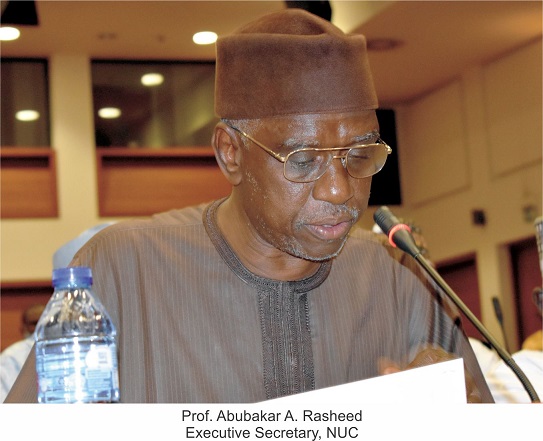
The Executive Secretary, National Universities Commission (NUC), Professor Abubakar Adamu Rasheed, mni, MFR, FNAL, last Wednesday defended the budget estimates of the commission, federal universities as well as the three Inter-University Centres (IUCs) for the 2021 appropriation year before the National Assembly Joint Education Committees of the Senate and the House.
Beginning with the NUC budget, Prof. Rasheed outlined a Capital budget estimate of N1.04 billion, Personnel Cost of N1.8billion and Overhead Costs of N737 million, respectively.
He stated that the roles and responsibilities of the commission had continued to expand with the supervision of 175 direct universities made up of 45 federal universities, 50 state and 79 private universities.
He added that out of 45 federal owned universities, four were in the Ministry of Agriculture, with three belonging to the military establishment, while a new University of Transportation, Daura, was under construction, adding that there were about 104 affiliate institutions as members of the wider Nigerian University System (NUS), under the purview of the commission.
He explained that the total budget of the commission in the current fiscal year was N1.3 billion while total release was N420 million out of which the sum of N240 million was utilized with a balance of N119 million which would be used before the end of the year.
He added that only N363 million had so far been released from the overhead, out of which N262 million had been utilized with the balance of N101 million which would be used in the coming weeks.
Speaking on the Internally Generated Revenue (IGR) of the NUC, Professor Rasheed explained that this was solely derived from investment in its landed property at Okoi Arikpo House in Lagos, as rents, with the total of N74 million received by September, 2020, out of which the statutory 25 per cent required by Financial Regulations had been remitted to the coffers of the Federal Government.
On the 2021 proposed budget, the executive secretary said the budget office cut it down to N1.7 billion, adding that while capital stood at 1.2 billion, 106 million was projected for the IGR, 25% of which would be remitted to the CRF, while N79 million would remain for internal use.
He informed the meeting that the commission’s staff strength as at 2018 was 688 and that it dropped to 642 in 2019 and 628 by the year 2020 due to retirement by some staff and movement by others.
Speaking on the entire budget outlay of the Federal universities and three IUCs, the executive secretary highlighted that the budgeting which was based on the envelope system had been making their budget performances restrictive.
He noted that the peculiar challenge of universities and allied institutions had not been addressed in every budget cycle of the federation, thereby not allowing the system have as much as was required to take care of its needs.
The executive secretary said that the 2020 was an unusual year for every one due to covid-19 pandemic which ravaged the whole world, noting that the federal universities were yet to start academic activities due to strike action embarked upon by ASUU. He explained that the meeting was ongoing between the unions and the representatives of the federal government.
He solicited the support of members of the joint committees for prompt release of the budget, saying that this year would extend beyond twelve months as eight months had already been wasted due to corona virus and when the universities eventually resumed they would complete all their activities.
Explaining further on the universities and IUCs performances for 2020, he said that the total Personnel Cost was N278 billion out of which only N118 billion had so far been spent because salaries had not been paid as a result of ASUU strike, adding that N5.9 billion was budgeted as overhead allocation but that only N1.3 billion was so far released. He explained further that N12.9 billion was budgeted for capital cost but only N5.3 billion had so far been released.
In their separate remarks on the budget, the Chairman Senate Committee on Tertiary Education and TETfund, Senator Baba Ahmed Kaita and his counterpart at the House of Representatives, Hon. Aminu Suleiman Fagge, said the meeting was the largest committee in both the Senate and House of Representatives because of the number of universities involved. They expressed worry over late submissions by some universities, saying that this had become a yearly routine whereby some of them would inadvertently submit their budget proposals behind schedule.
They urged the vice-chancellors to ensure that the universities always comply with the schedules and time line for budget proposal defense. This, they said, was to enable members of the joint committees to digest, peruse and interrogate where necessary and to be able to address the identified challenges ahead of the presentation.
The chairmen of the joint committees commended the executive secretary for his style of leadership which had helped in repositioning the NUS to enviable heights. They also commended the executive secretary for his compliance with the Financial Regulation Policy on Remittance, pledging their continued support for the commission to ensure that it succeeded in its regulatory efforts towards making the NUS globally competitive.
The Joint Committee said that while it was not averse to genuine demand to upscale allocations of universities due to their peculiar nature, it was however demanding for a justification for how the IGR was generated and how it was spent in order to ascertain the funding gap and determine how to allocate same.
At the presentation were vice-chancellors of all the federal universities and their bursars as well as the chief executives of the IUCs and their finance officers.
The executive secretary was accompanied by the Directors of Finance and Accounts, Mr. Sam Onazi and Public Affairs, Mal. Ibrahim Usman Yakasai. Others present were the Deputy Directors of Treasury Division, Mrs. Hauwa Amos and Information Division, Mal. Lawal Haruna Ajo.
